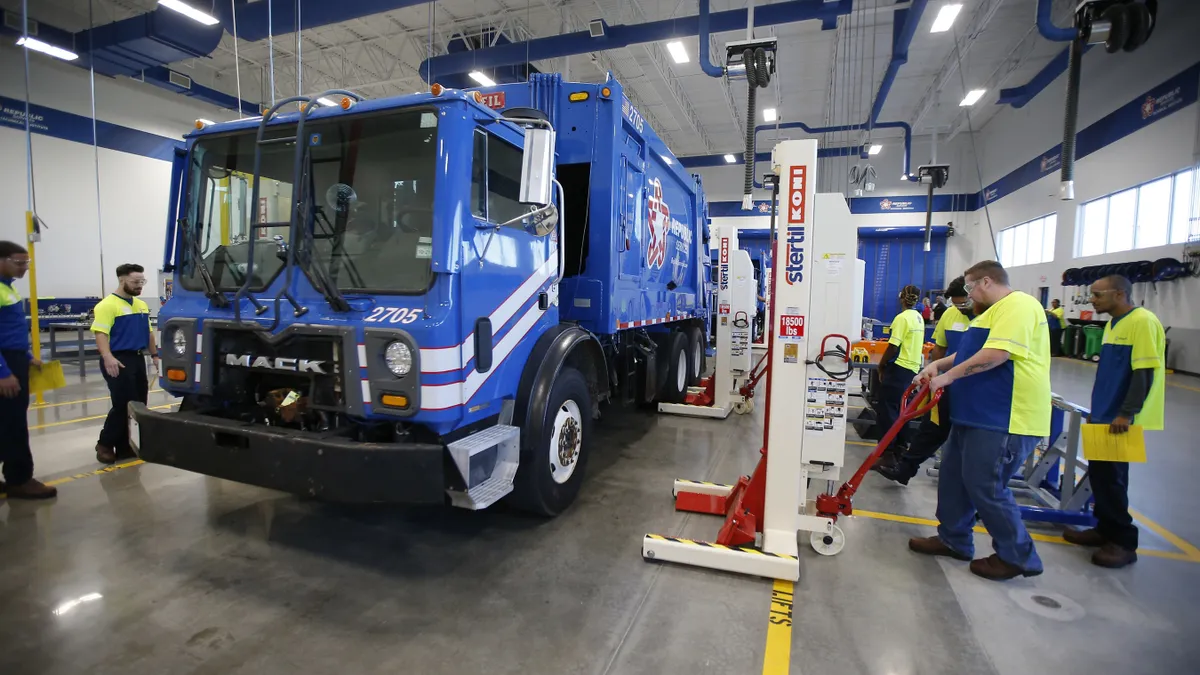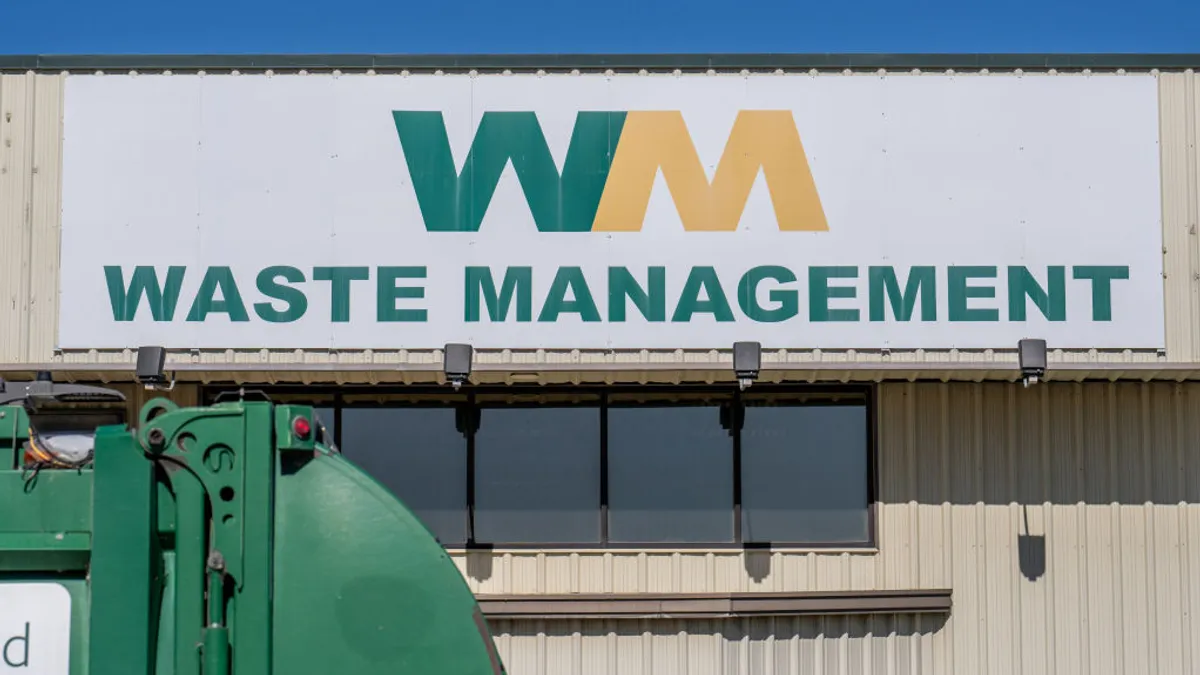The difficulty of recruiting and retaining enough CDL drivers and other workers has vexed the waste and recycling industry for years, but much broader cross-industry labor challenges during the pandemic have brightened the spotlight on this issue.
During quarterly earnings calls in recent weeks, leaders of the waste and recycling industry's large public companies detailed some of the costs associated with current staffing challenges. They also described potentially forgoing new business as a result of not having enough workers, leaning into automation and investing in training programs.
Read on for quotes from top executives on how they're currently thinking about hiring and retention, and check out all of Waste Dive's in-depth coverage on third quarter earnings reports.
Casella Waste Systems
The company reported that, given the challenges in attracting and retaining front-line workers, it increased hourly wage rates over budgeted rates, which added $700,000 in costs during the quarter, according to Chief Financial Officer Ned Coletta. He said that "labor constraints this year limited our ability to capture all available growth in the market." Separately, CEO John Casella said that route optimization and automation have been key in regaining some labor efficiency.
John Casella: "From a labor perspective, our continued investment into our human resources [and] technology programs has certainly helped to mitigate some of the challenges. Over the past several years, we have reset our labor rates in many markets, provided improved transparency through our career path initiatives and then have significantly invested in training, including our new CDL school. The outcome of these initiatives has helped to bring improved stability across our workforce, while lowering turnover and improving retention."
GFL Environmental
The company noted pricing is key given that operating in the current labor market is more expensive. CEO Patrick Dovigi also said that labor challenges peaked in the spring or summer and that pressures today aren't as bad in secondary markets where GFL tends to operate. The company's focus now is being staffed appropriately come spring 2022.
Dovigi: "Yes, labor issues and challenges are definitely real. I think when you talk about pricing and labor, I think it's all sort of part of the same conversation because at the end of the day, our business is very simple. We're paid to pick up waste. If we don't pick it up, we can't put the price increases, and we're bringing in a lot of churn in that book of business, right? So I think they're all sort of tied together.
"But if you pick up the waste, you can generally charge whatever you want. If you think about subscription residential or commercial, a customer doesn't really care whether they're paying $17 or $18 a month or they're paying $25 a month. At the end of the day, they just want you to pick it up when you say you're going to pick it up, and then that will afford you the ability to charge what you want. Yes, labor is tight, but at the end of the day, this is what we're paid to do."
"And you've got to be selective about new business because it's not a robust labor market today, where you can grab in different pools. And so when you're winning new business, and you're winning new municipal contracts, you better make sure you're getting it at the right price because there's going to be some wage replacement that goes into it."
Republic Services
The company said it "left some volume on the table" and would have gone after more opportunities had the company had more workers, according to CEO Jon Vander Ark, who also touted the company's newly launched Technical Institute for diesel technicians.
Vander Ark: "We think our employee value proposition has been really strong. And while turnover has been elevated, it's been modestly elevated. And we've really — we would have taken more people, if we could, to pursue some incremental growth opportunities, but our retention has been really strong. Now, that being said, we're facing the same pressures of the macro environment. So we've looked and done surgery and targeted markets where we think we weren't as competitive or maybe turnover was elevated.
"But you kind of take those costs increases, and you offset it with what we think is our digital ops in our RISE platform, which is really driving productivity. We look at our performance in the quarter versus 2019, we're just seeing we're getting more work out of the same labor hours. And that's been really productive. And I think you're seeing it hold in a very challenging environment. And then, on top of that, of course, we're pricing because the market bears it and we want to support future wage increases for our employees."
Waste Connections
The company reported that it "proactively addressed labor constraints through wage adjustments covered by incremental price increases," per remarks from CEO Worthing Jackman. He also said overtime has been up by double digits, like it has been for other competitors. Throughout the call, Jackman discussed how the company is strategizing around retention and recruitment in the current landscape.
Jackman: "If we're stepping up and improving our processes ... I would hope more people that we're hiring lately will stay with us longer and give us a chance. This is a hard industry to work in. We recognize that, and we have to do all we can to engage our people and make for work-life balance for our drivers."
"I would say if you step back and look at the, whatever they call this period, The Great Resignation, The Great Stay-Home Period, whatever you want to call it... the pressures in our markets are no different than other companies. We're all up significantly [year over year], our openings are up now, our openings have stabilized over the past few months. We're hiring a record number of people every month. We're focused on retention and making sure we can keep more of those people longer to get them to their first year anniversary."
"You've got to accept the realities of what it takes to try to keep a workforce: pay them well ... care about hours of service, care about the equipment that they're running in ... but you've got to recognize the reality of that and then price your way through it."
Waste Management
The company said it faced "an unexpectedly acute and fast-moving challenge from the inflation, supply chain and labor shortage headwinds," according to CEO Jim Fish, and it called out about $60 million in excess labor inflation in the quarter.
Fish: "We've said previously that we view the automation of certain high-turnover positions as both a competitive advantage and a de-risking mechanism in today's labor market, where certain jobs simply don't attract the interest they previously did. The most recent examples of that are the customer setup role, which we just finished fully automating, and the 35-plus-percent reduction in labor we've seen, where we've upgraded and rebuilt our single-stream recycling plants."
"I don't think we can overstate the importance of using automation to take some of the labor intensity out of this business. It's a very labor-intensive business. We have positions that have very high turnover that does not imply that we're going to come out with a big reduction, that's not what I'm saying. I'm saying we can automate some of these roles and then use the attrition to our benefit."



















